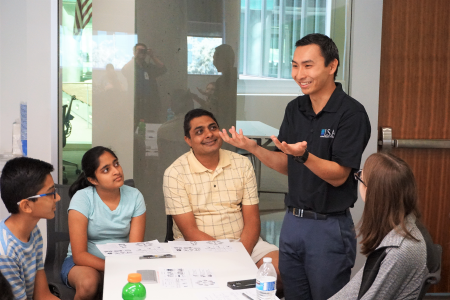What Does My Child Need to Be Successful?
December 21, 2020
 What does my child need to be successful? Isn’t this the question on every parent’s mind? For some parents, making sure their child is successful is more important than maintaining a good relationship with their child.
What does my child need to be successful? Isn’t this the question on every parent’s mind? For some parents, making sure their child is successful is more important than maintaining a good relationship with their child.
Research has shown there are very few things that can ensure a child’s success more than a healthy relationship with their parent(s). In a 70-year Harvard study, researchers tracked the health and success of 268 men over the course of their lives. After analyzing a variety of factors and habits, they found, “…the only thing that really matters in life are your relationships to other people.” The quality of relationships was the only thing that correlated to health, happiness, and stability.
Although we form many relationships in our lives, the first and most foundational relationship is the one we have with our parents or guardians. Unfortunately, many parents don’t realize this until it’s too late.
In this article, you’ll learn the most important skill to teach your children and how you can make minor changes in your daily habits to reinforce that skill.
The Only Two Things You Can Teach a Child
 There are many things a parent can focus on to promote their child’s success. However, there are two main categories of things you can focus on—I call them either technical traits or personal characteristics.
There are many things a parent can focus on to promote their child’s success. However, there are two main categories of things you can focus on—I call them either technical traits or personal characteristics.
Technical traits deal with either physical or mental skills that enable a person to do something specific to one area of life. For example, learning how to play a sport like basketball is a technical skill. Another example is learning how to read or how to do math. These technical skills allow you to perform activities associated with numbers or words.
On the other hand, personal characteristics focus on habits and perspectives. For example, one personal characteristic is honesty. When a person develops their ability to be honest, they act with integrity: they will tell you the truth when things happen, and they won’t try to steal. Honesty doesn’t relate to any one specific skill, but it impacts everything someone does.
Personal skills connect to everything a child does, whereas technical skills will only impact specific aspects of life. If a child decides they don’t like basketball after high school, that skill won’t help them in other areas of their life. Many times, when a child is developing a technical skill, they also will be developing a personal characteristic as well. As they play basketball, a technical skill, they play with other people and learn teamwork and leadership skills, which are personal characteristics.
Most parents know the importance of personal skills, but they put more effort/stress in supporting technical skills. This involves getting a good GPA, learning to play a musical instrument, developing a skill, playing a sport, etc. The interesting thing is that although technical skills are good to have, personal characteristics tend to be more related to a child’s success. Many successful people can attest to this. This doesn’t take a lot of research to find this out: start looking at motivational speakers, successful businesspeople giving advice online—very few of them focus on technical skills, they all focus on personal characteristics.
The Top Personal Characteristic That Will Help Your Child Be Successful
 There are many different characteristics that people claim will make your child successful, but I have worked with thousands of college students and high school students, and I believe that one personal characteristic stands above all others.
There are many different characteristics that people claim will make your child successful, but I have worked with thousands of college students and high school students, and I believe that one personal characteristic stands above all others.
All successful people must learn to ask for help.
It is critical that all young people learn that it’s okay to get help—especially from their parents. With the technological advancements in the world, it has made life easier in ways, but it’s also made life more complex. There is ten times the amount of competition in the world since we’re connected on a global scale. This change has made it almost impossible for a person to obtain success on their own. Thus, the ability to ask for help has become a requirement for success.
I have also observed that asking for help is a difficult characteristic to develop. To learn this, students must start by asking their family for help, especially parents. So, if a child is comfortable asking for help from their parents and accepting it, there is a much greater likelihood they are also able to ask for help from others.
I have also found that there are few people in the world that will think in your best interest, understand you, and will put forth a lot of effort to help you with little or no benefit in return. This is what parents do every day.
If a child will consistently accept help from their parents, they end up making the best choices and getting the most support in fulfilling their dreams. And let’s face it: parents will offer better advice than most friends and peers. In college, I saw this a lot—students receiving advice from other students who were also trying to figure out life. Getting advice from older and wiser people always has its benefits.
Impact of Having a Good Relationship with Your Child
 In order for a child to be comfortable and willing to ask for help from their parents, they need to have a good relationship with them. It is difficult enough for any child to ask for help from their parents, but it is impossible if they have a bad relationship with their parents.
In order for a child to be comfortable and willing to ask for help from their parents, they need to have a good relationship with them. It is difficult enough for any child to ask for help from their parents, but it is impossible if they have a bad relationship with their parents.
If parents realize that a good relationship will enable their child to develop the most important characteristic of success, they might think twice before sacrificing their relationship for things that are less important such as grades, sports, school, cleaning their room, etc. There are so many things in this world that can distract from maintaining a good relationship with our children.
I once worked with a very successful CEO who owned several companies. He told me a story about how he enforced good grades in his household. He hassled his son so much that their only interaction became arguing about school. His wife finally told him he had to do something about it. He talked with his son and decided he had to stop worrying about grades. After that, his son didn’t get the best grades, but they became close friends. Over the years, the son went on to become more successful than his father.
What is the impact of having a good relationship with your child? When your children feel supported, they will more likely feel happier and they will find more successful in the long run. It gives them a chance at developing the most important personal characteristic: asking you for advice.
5 Things You Can Do to Build a Good Relationship with Your Child
Now that we’ve talked about the long-term importance of having a good relationship with your child, here are 5 things that you can do to develop that good relationship with your child:
- Listen to them—This is such a simple action, but it’s hard to do. Listening means just that. You listen. It doesn’t mean judge them and tell them they are wrong. It doesn’t mean giving advice. It means listen to what they are saying. You can speak, but it should be in the realm of listening and understanding. When you listen, minimize how much you talk.
- Do things that they like to do—This might be uncomfortable but spending time with your children is a must for building relationships. And remember, it’s about doing something they enjoy doing, not that you enjoy doing. Maybe if your relationship is more advanced you can start doing things you like sometimes.
- Be supportive—Every parent has a different ability to be supportive for their child. This is just as tough as listening to your child. Being supportive means helping them with things they like to do—not things that you feel they should be doing, not things that you feel they need, and not things that would be good for them. Support things that they want, even if you don’t feel it is a “good” thing. Now there are some things that you can’t support, like illegal activity and things that harm others, but usually children don’t want that type of thing. Most people can usually find something that their child wants that can be supported (hobbies, interests, etc.)
- Treat them like a peer—Often, parents wonder why their kids don’t take them seriously or why their kids don’t respect them. Usually, it’s because parents and adults in general don’t respect and take their kids seriously. Children are great learners, and they are great at observing what is going on. The more you treat your kids with respect and take them seriously, the more they will respect you and this increases their chances of asking you for help and advice.
- Allow them to be themselves—Throw your expectations out the window and accept your child for who they are. Amazingly, if you do the first 4 suggestions, you will definitely understand your child more and it will allow you to accept them more.
Conclusion
I hope there was something in this article that will help you with your child. And hopefully along the way, you can develop a good relationship with your child, enjoy them, and even have some fun, while helping them become great!
About the Author
Read more about Dr. Jacob’s latest book.
Dr. Jacob Kashiwagi is business management consultant and acting Chairman of the Board for Leadership Society of Arizona. Dr. Jacob has worked on 1,100+ industry projects valued at $3.6 billion with a 95% success rate. He has taught over 1,300 college students and 2,500 high school students.

